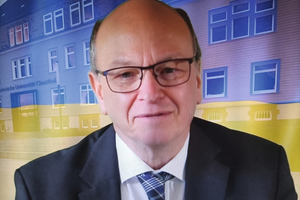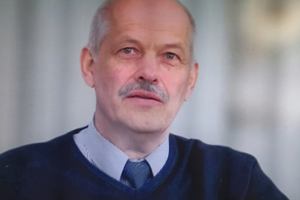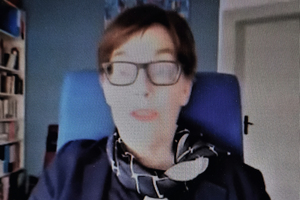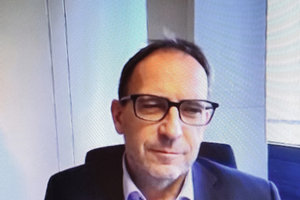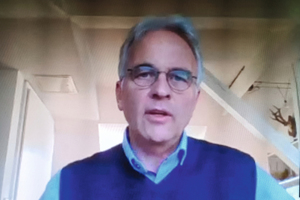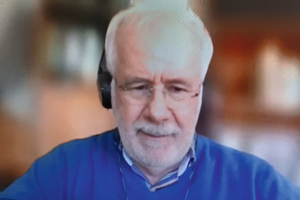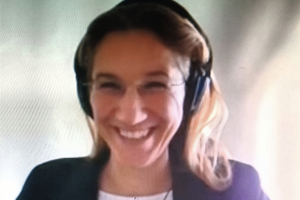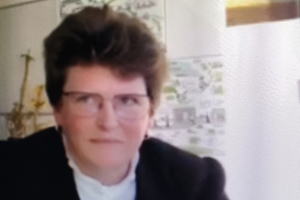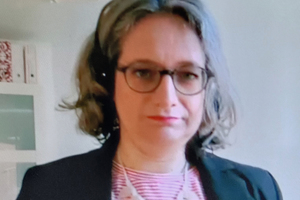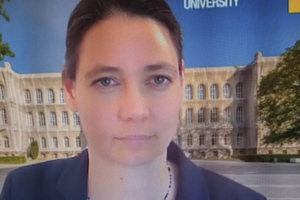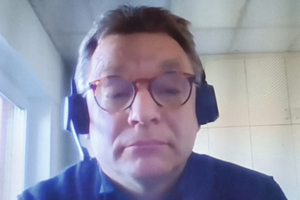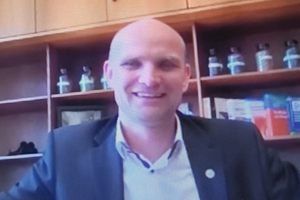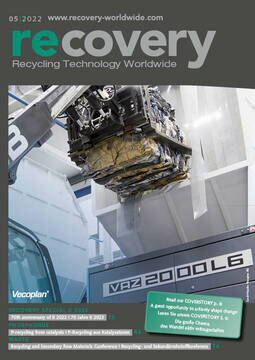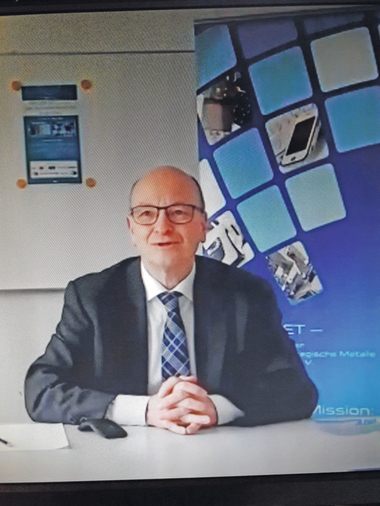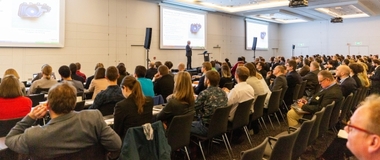Once again high preference: plastic and electronic scrap recycling
This year it was not only the pandemic that had an impact on the conference taking place on March 07 and 08, 2022, but it was also overshadowed by the Ukraine war. Thus, Prof. Dr.-Ing. Goldmann, TU Clausthal called for solidarity with Ukraine and all those who oppose this insane war of aggression at the beginning of his opening speech and introduction to the plenary session. „Under these circumstances, the issue of circular economy for raw material supply becomes more important than ever. While recycling cannot solve all bottlenecks, it can make a significant contribution,“ he concluded based on this frightening situation. Prof. Dr.-Ing. Dr. h. c. Friedrich, RWTH Aachen, who received an honorary doctorate from the University of Donetsk in 2014, assured to provide help for Ukrainian refugees and to give them the opportunity to work at RWTH Aachen.
In order to enable as many interested people as possible to participate, the TK-Verlag GmbH, Nietwerder-Neuruppin as organizer had offered the conference, at the planning of which it was in no way clear whether it could take place in presence, simultaneously in WEB format. Daniel Goldmann, Director of the Institute for Processing, Landfill Technology and Geomechanics, Clausthal University of Technology, and Prof. Dr.-Ing. Dr. h. c. Bernd Friedrich, Director of the Institute for Metallurgical Process Technology and Metal Recycling, RWTH Aachen University. They were assisted by Dr.-Ing. Olaf Holm (program coordination) and M. Sc. Elisabeth Thomé-Kozmiensky (conference organization) from TK-Verlag.
On the first conference day, a plenary session was again held with the following main topics:
Political and societal frameworks.
From linear to circular value creation – and then?
Scientific strategies
The second day again dealt with the two highly topical and environmentally relevant issues of
Electronic scrap recycling
Plastics recycling
These wide-ranging topics addressed executives and experts from the scientific and administrative sectors as well as plant manufacturers and operators, service providers, planning offices and consulting companies.
Plenary session – Political and social framework conditions
The path of Lower Saxony, a region particularly affected by climate change (car and steel industry) on the way to climate neutrality was described by Dr. Ulrike Witt, Office for Regional Development, Braunschweig) in her contribution „Circular Region Niedersachsen. The Braunschweig region leads the way!“ The speaker presented many ideas in this regard, for example the formation of a hydrogen campus in Salzgitter with the participation of industry (Allstrom, Bosch, Salzgitter AG), science (Fraunhofer) and administration, but also examples of implementation such as the production of green steel (Salzgitter AG) or the production of electric cars (VW AG). She underlined the importance of the joint approach of industry, science, politics and society. To develop a Circular-Region, a cross-industry and cross-company recycling strategy is required. In a similar vein, Heiko Thomas, Councillor for Climate and Environment, gave a presentation, City Operations and Buildings: „Circular Cities Declaration – Aachen on the Way to the Resource Turnaround.“ Aachen was the second city to sign the „Circular City Decleration“ in 2021 and can already show results today, which the speaker reported on. In particular, he presented four concrete fields of action where sustainability and circular economy are practiced: Redesign of the city‘s waste disposal operation, conversion of the administration building, land unsealing and creation of climate-neutral neighborhood heating around the germ cell.
From linear to circular value creation
In the next lecture („The Anthropocene Imperative – Transformation to a Circular Economy“), Professor Dr. Reinhold Leinfelder, FU Berlin, gave a very impressive description of how mankind has negatively changed the earth in terms of raw materials over the last 70 years or so. Mankind currently consumes 70 % more than what our planet can renew. We have abolished wilderness, 60 % of all plastic is somewhere in the environment – these are just a few facts that reveal how man is destroying the basis of his life and the extent of anthropogenic alteration of the Earth system already today. Prof. Reinhold presented a new approach to sustainability based on the Anthropocene (human geology) and derived various future scenarios. As much as the speaker sees himself as an advocate of the circular economy, he urged that energy use be taken into account in the process. His conclusion: rethink sustainability, approach problem solutions in a networked manner, implement visions, learn from the biosphere in the process, and most importantly: it must be started – and started now! For our future relationship with nature, the following must apply:
1. live from nature – by integrating into natural processes, 2. protect ourselves from nature – by stabilizing the Earth system.
This cautionary finger regarding the handling of nature, our resources and the negative climate and environmental changes that have already occurred was a common thread running through the other contributions. This was also the case in the following lecture by Prof. Dr.-Ing. Daniel Goldmann „On the way to the Circular Society“, in which the speaker also outlined the challenges facing mankind and presented his ideas for successfully facing them. Thus, it is necessary to move from the „Circular Economy“ to the „Circular Society“; more than recycling is needed, namely Rethink. „Only through joint initiatives by science, business and civil society will the Circular Society succeed in solving all our problems,“ Prof. Goldmann is certain.
The restructuring of our society under the aspect of „Production and supply in an economy without growth“ – the title of his presentation – was outlined by Professor Dr. Niko Paech, apl. Prof. University of Siegen. His reflections on the downsizing of the economy, possibly accompanied by unemployment and the resulting necessary restructuring of society, led him to an economic theory of frugality (sufficiency). These gave rise to an extensive discussion on the topics of technical progress in connection with the survivability of mankind, extension of the useful life of appliances and machines, their reparability and repair possibilities, population growth, education, to name but a few.
Future strategies
This topic area was introduced by Min. R. Dr. Wolf Junker, BMBF Bonn, with his presentation „From recycling to circular economy - approaches from the BMBF‘s technical program“. He listed a whole number of funding activities that are being worked on primarily in his department „Resources, Circular Economy and Geo Research“, including the joint measure EMSARZEN (€ 1.5 million, duration 2021 – 2024) for the processing of slags from waste incineration plants for the cement industry and for metal recovery. But other projects in the area of the future of work and value creation were also mentioned from the numerous and varied activities of different sizes. They are all to be included in a roadmap and contain recommendations for action for implementing the Circular Economy in Germany by 2030. The goal is to achieve net zero greenhouse gas emissions in the EU by 2050 with absolute decoupling of economic growth from resource consumption. A national circular economy strategy is currently being developed.
The possibilities of digitalization and artificial intelligence (AI) for the circular economy as well as experiences from the real lab were shown by Prof. Dr. Andreas Rausch, CEO DIGIT TU Clausthal and Sebastian Lawrenz, GF Sense4Future GmbH, Goslar. Despite many automated processes, there is still very great potential in recycling to replace manual activities with AI and digitization. The real challenge is Rethink. To this end, the first „real lab“ is being created at TU Clausthal using AI and digitization, which will conduct market-oriented research and technical-economic testing through cooperation between research, business, politics and society. The first example of this is the project Sense4Future and WEEE Harz Pilot, which was presented.
The development of producer responsibility for electrical equipment in Germany was the focus of the presentation by Dipl.-Geol. Klaus Hieronymi, Circular Economy Consulting, Oberursel, with a look back to the beginnings of electronic equipment production and disposal in the 1960s, when almost everything was still landfilled. The urgency for extended producer responsibility grew, but it wasn‘t until 2005 that the EEG was promulgated. Today, WEEE laws exist in 145 countries worldwide. The goals of the associated producer responsibility changed over time: 1990 et seq. Minimization of waste to landfills (target: recycling), 2020 ff. Circular economy (focus on secondary raw materials), today circular economy (focus on reuse). It is important for manufacturers to develop new business models (repair, used equipment) and for consumers to change their attitude towards used equipment. The discussion focused on the transboundary shipment of waste and the whereabouts or recycling of the equipment (Ghana, Kenya, etc.), economic efficiency in the face of drastic increases in transport costs, and non-existent recycling facilities in these countries.
Secondary raw material potentials
Moderated by Prof. Dr.-Ing. Dr. h. c. Friedrich, the digital platform Recycling Raw Materials was first presented under this topic by Dr. Britta Bockhagen, DERA at BGR, Berlin. DERA was commissioned by the Federal Ministry of Economics and Climate Protection (BMWK) to manage this platform, which is scheduled to run for two years (2021 to 2023). With the aim of developing options for action that contribute to increasing the share of recycled raw materials in the supply of raw materials to German industry, the topics of metals and industrial minerals are being worked on in various working groups. So far 350 participants have registered. The kick-off event took place in the fall of 2021, a round table will be held in the fall of this year, and the final report is to be submitted to the BMWK in the fall of 2023. According to Dr. Bockhagen, the next tasks are to develop a common frame of reference, including some topics for recycling raw materials, technologies and processes, and to bring interested parties together for this purpose. After an overview of the dialogue platform, the speaker invited people to register for the individual working groups.
In the contribution „Recycling in metal production and processing in Germany,“ Dr. Asja Motzke-Blöß, Clausthal University of Technology, reported on a study „Status quo of recycling in metal production and processing in Germany“ which was commissioned by DERA. For this purpose, the system boundaries including import and export in the metal production and metal processing sector were considered and the material flows, procedures and processes as well as the locations of the plants were determined. Circulation models were also included in the study. It is to be published in summer 2022.
Dr. Burchert and Dr.-Ing. Winfried Bulach, Öko-Institut e. V. Darmstadt, shed light on „Germany‘s raw material potentials through urban mining until 2040“. With a funding volume of € 1.5 million so far, a mapping of the anthropogenic stockpile (AL) with the project parts KartAL I (size, composition, dynamics), KartAL II (model, database) KartAL III (obstacles and solution approaches; material flow management basis) and KartAL IV (material cadastre; material extracts) has been carried out since 2012. In addition to general statements on the performance of the KartAL series, the focus of the presentation was on the KartAL III project part with two material systems (construction and demolition waste; base and special metals) as well as the project modules dialog and networking, fact checks and brochures, volume flow forecasting and solution approaches. The aim is to establish material flow management integrating recovery chains to increase the quality and quantity of recycling of metals and mineral building materials. The final report will be published in mid-2022, and some brochures are already available from the BMU.
In the panel discussion, Prof. Friedrich pointed out that „everything must be done to maintain the German metal industry and establish recycling even more strongly.“ The supply of raw materials is taking on a whole new dimension, we can‘t really afford to shut down plants at all anymore, and cell production including recycling must be installed in Germany,“ Dr. Burchert also reiterated this view.
The second day of the conference was no less exciting than the plenary session on the first day, and the decision to attend the individual presentations in both sections was not an easy one.
Electronic scrap section
Three overview papers revealed the whole problem, but also the chances, which the recycling of electronic scrap (e-scrap) already offers under today‘s technical possibilities. Dipl.-Ing. (FH) Bernhard Jehle, ZME Elektronikrecycling GmbH Heuchelheim a. d. Lahn gave a current status report on the collection and treatment of electronic scrap in Germany, but also in relation to the EU. In 2020, the collection rate in Germany was 45 % instead of the 65 % already required by WEE in 2019. A whole series of reasons (e.g. handing over destroyed equipment, misthrow in magnitude, improper storage) lead to the fact that the monitoring cannot be complete and a continuous pollutant removal is not guaranteed. There are further problems in the area of treatment, which even the regulation in force since 01/2022 does not eliminate and whose inadequacies were pointed out by the speaker. He warned of the consequences, which would ultimately lead to a weakening of Germany as a recycling location. After all, the constant lowering of limits according to EU POP has a negative impact on the recycling of plastics from e-waste. Opportunities are seen in increasing producer responsibility, designing for recycling, reparability and increasing the use rates for secondary raw materials. In order to further develop the collection and treatment system and to uncover potentials, reliable framework conditions and a common recycling effort are required.
Exactly in this direction runs a project, which Mrs. M. Sc. Jasmin Hoff, TU Clausthal presented in her contribution „Activation of the civil society – science communication in the field of electro(nic) waste equipment collection“. She used many examples to show how, under the motto „Public Relation Work for Recycling“ in the Harz region, civil society can be motivated to recycle through collection campaigns in various institutions and through surveys, also involving large markets. A drive-through collection campaign is planned for 2022.
ReUse, ReFit and Repair of electrical (electronic) items
This topic is known to be gaining more and more importance in the wake of sustainability and the Circular Economy, including at the Berlin conference. „Consumer perspective on repair service: what are the perspectives for more sustainability?“ discussed Ms. Ursula Weber, Ritec Trade& Consulting GmbH & Co. KG, Lüneburg. Using the example of notebooks, she showed the urgent need for action to increase the useful life and make use of repair services. Government incentives for the latter are desirable, as in Sweden, for example (reduction of VAT for repair services, no extension of depreciation, promotion of skilled worker training). The second-hand market for electronic equipment was examined by Benjamin Butz, Teqcyle Solutions GmbH, Munich, using notebooks as an example, and SRH‘s ReUse strategy as a second chance for old electrical equipment was highlighted by M. Sc. Yanik Moldt, Hamburg Institute for Innovation, Climate Protection and Circular Economy GmbH, Hamburg.
Sustainability of electro(nic) articles
This section dealt with both repairing and recycling, in particular high-quality metal recycling of used electronic devices. Dr.-Ing. Andreas Wenda, Robert Bosch GmbH, Hildesheim, used a practical example to show how sustainability can be achieved through repair. 100 smartphones (Apple and Samsung) were the objects of investigation for the recycling project on interface optimization between reprocessing and metallurgy, reported on by Ms. M. Sc. Merle Hüsgen and Ms. Dzeneta Vrucak, both RWTH Aachen. As reasons for the insufficient realization of the circular economy, they named the complexity of the products, the unsatisfactory framework conditions (heterogeneous dynamic waste stream, lack of transparency on composition and recoverability, finding suitable recycling processes) and further interfaces in the cycle that need to be improved (better conditions for collection and motivation to hand over, lack of design for recycling and insufficient political/legal framework for increased recycling).
The legal, technical and economic barriers on the way to more remanufacturing of used ITC devices (small devices of information and telecommunication technology) were discussed by RA Hans-Jochen Lückefett, Min. D., visiting professor at Shanghai Polytechnic University. He named three barriers: 1. price-driving new legal regulations, 2. lack of customer confidence as the basis for their demand, and 3. the supply of unsuitable equipment. In order to remove, or at least reduce, these barriers, the speaker derived the idea that the companies involved in remanufacturing should establish an association to represent their interests with specific objectives.
A comprehensive presentation with clear demands directed at politics, business, science and society on the subject of „High-quality metal recycling for a Circular Economy (CE) of electronic products“ was given by Dr. Christian Hagelüken, Umicore AG & Co. KG, Hanau. His conclusion included „CE is more than recycling – also optimization of use and lifetime (incl. repair); real CE requires fundamental changes in development, design, distribution, use and recycling of products with high raw material relevance.“
Plastics Recycling Section
With 11 presentations, the topic of plastics recycling was also appropriately represented in line with its importance this year. A broad program ranging from digitalization in modern sorting plants (Andreas Jäger, Steinert GmbH, Cologne) circular economy in the fashion industry („Rethinking fashion“, GF Ms. Robina von Stein, R.E. S.M. RE-NT UG, Berlin – transforming the purely linear fashion industry into a circular economy) to a consideration of the potentials of sorting technology and modeling (Univ. Prof. Dr. Kathrin Greiff, ANTS RWTH Aachen) introduced this section.
Mechanical plastics recycling
Moderated by Prof. Dr.-Mont. Roland Plomberger, Montanuniversität Leoben/A, for example, Dipl.-Ing. Clas Ötting, Relux Kunststofftechnik GmbH & Co. KG, Magdeburg, spoke about high-quality recycling of mixed plastics from packaging in technical products. A process was presented in which railroad ties are produced from 70 % postconsumer mixed plastics (baled goods from sorting plants) and 30 % production waste via various dry processing stages (shredding, sorting) and subsequent mixing, compounding and pressing, if necessary with the addition of additives. They are available in individual formats according to customer requirements and application. The main advantages of the sleepers are relatively low energy consumption, water-free process, reuse as input after use, replacement of wood treated with cresol (ban on use). Operational suitability tests at the Technical University of Munich, were positive. Finally, numerous technical applications with sleepers of the sleeper manufacturer pioonier GmbH, Bad Oynhausen (Leipzig, Frankfurt a. Main, Bochum, Hanover, Stockholm), which belongs to the company, of this closed cycle were presented. Sensor-based sorting was the focus of the two presentations by M. Sc. Jannick Schmidt, Pforzheim University of Applied Sciences (results of the MaReK research project) and by Ms. Sabine Schlögl, Montanuniversität Leoben/Aim.
Chemical plastics recycling
In his very informative overview lecture, „Overview of Thermochemical Conversion Technologies for Chemical Recycling,“ Prof. Dr.-Ing. Martin Gräbner, TU Bergakademie Freiberg, first gave a brief introduction to chemical recycling, stating, „There is no clear definition for chemical recycling.“ However, different technologies and recycling paths exist due to the different waste fractions. His further remarks focused on pyrolysis and gasification. For the former, a large number of technologies exist, predominantly rotary kiln, screw and stirred tank reactors with an average reactor capacity of 12 t/d; the target throughput is about 60 t/d. For gasification, there is generally greater feedstock flexibility but a smaller number of technologies. Fluidized bed and fixed bed (+plasma) reactors are predominant. The average reactor capacity is 67 t/d; the target is 350 t/d. Prof. Gräbner illustrated the technologies of the two process variants with numerous technical application examples.
The contribution by Dr. Thomas Probst, bvse e. V., Bonn „Chemical plastics recycling – competitor or supplement to mechanical recycling?“ was also very interesting. He sees opportunities for chemical recycling in the limitations of mechanical recycling. Environmentalists view it negatively, among other things because of its high energy consumption. However, the speaker concludes that mechanical recycling of plastics will become largely superfluous in the future and that recycled plastics will therefore disappear from the market.
In the shredder light fraction (SLF) sector, chemical recycling can also be part of the solution, as Dr.-Ing. Georg Daun, BASF SE, Ludwigshafen, explained in his paper. The evaluation of 18 studies on the subject showed the wide dispersion of the various proportions, with rubber and plastics being the main components. BASF is currently working with various partners on two ASR (Automative Shredder Residue) projects to decide which of the possible routes – mechanical and/or chemical recycling of plastics from end-of-life vehicles – will lead to success. The question has already been raised – also from an economic point of view – whether the SLF that cannot be recycled mechanically should be fed to pyrolysis in order to synthesize new plastics from the resulting pyrolysis oil.
The presentation „Complete recycling of fiber-reinforced epoxy resin systems with boron halides“ by Prof. Dr. Dieter E. Kaufmann, TU Clausthal and Manfred Müller-Gransee, Environment Intelligence GmbH, Bad Grund was an excellent example of circular economy. A process was presented with which, using boron chloride, it is possible to recover fibers and monomers in virgin material quality. This means that there is no downcycling of the CFRP and GFRP products.
Résumée
Although the number of participants this year was somewhat lower than in previous (corona-free) years, the organizers were able to look back on a positive balance. Circular Economy in a broader sense is gaining more and more importance and there are many efforts to prove the progress on this rocky road with practical, technical applications of research results. Sustainability – design for recycling, reuse, repair, development of leasing models – is increasingly being sought in both the electrical (electronic) waste and plastics sectors. Likewise, high-quality recycling is in demand as marketable products and raw materials need to be recovered. However, high-quality recycling is expensive and the market does not take this into account. In this respect, recycling will not be without consideration of raw material availability and prices; Circular Economy must not be an end in itself, as many speakers repeatedly emphasized. It is gratifying that efforts are being made at many levels (research, development, application, industry) to practice sustainability. Nevertheless – the repeatedly admonishing raised index finger alone is not enough! Action must follow on a broad level – and immediately. Proposals for feasible projects are available. The decision-making bodies in politics, business and society are called upon to act. In this respect, once again a big thank you to the organizer, TK-Verlag GmbH, for giving the circular economy such a broad platform. As expected, the event was again very well organized.
The next conference is scheduled for March 27-28, 2023.

